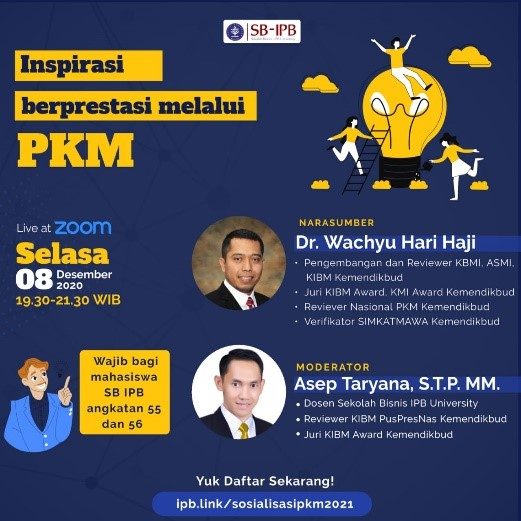
Achievement Inspiration Through PKM
IPB’s Business School held a socialization of Student Creativity Week activities with the theme of the activity “Inspiration for achievement through PKM”, this activity was one step to increase the creativity and innovation of SB IPB students. The speaker for this activity is Dr. Wachyu Hari, he is a national reviewer of PKM Kemendikbud, developer, reviewer of KBMI, ASMI, and KIBM Kemendikbud. In addition, he is a verifier of the Ministry of Education and Culture’s SMIKATMAWA.
The event was held virtually through Zoom Meetings on Tuesday, December 8, 2020, at 19.30-21.30 WIB and was opened by the Dean of the IPB Business School, Prof. Dr. Ir. Noer Azam Achsani. MS. The event was hosted by the moderator, Asep Taryana, STP, MM. He is a KIBM Reviewer and a Jury for the KIBM award from the Ministry of Education and Culture.
At the beginning of the presentation, the speakers and audience interacted about whether they had heard or known about PKM. The majority of SB IPB lecturers and students already know PKM. After that, it continued to discuss PKM, the purpose of holding PKM, and the reasons why you had to follow PKM. Not only a general explanation, but also discussing the types of PKM to how to find ideas and inspiration to writing ideas for PKM proposals. The source of inspiration can be seen through public problems and anxieties so as to create solutions in the form of unique ideas or products. The things that need to be considered in determining ideas include the usefulness of ideas, uniqueness, attractiveness, providing innovation, specific novelty and references or data that can be obtained. The key word for student creativity is that the idea must be quirky, evolutionary, and challenging.
If you have an idea, write it down immediately, because according to him the idea is not considered to exist unless it has become a series of words. Usually ideas come from problems or there is a gap between the desired idea and actual reality.
There are 8 fields in the Student Creativity Program (PKM), including PKM 5 fields (PKM Research, PKM Entrepreneurship, PKM Community Service, PKM Technology, PKM Creative Initiative), PKM Scientific Articles, PKM Written Ideas, and PKM Constructive Futuristic Ideas. Dr. Wachyu explained each program area starting from criteria such as core activities, number of members, output or output, proposal substance, and characteristics of each program. For example in PKM Entrepreneurship, students are expected to be able to create an innovative product that has previously had a market survey and open market opportunities and does not become competitors for similar products which are community income, the proposal must be able to describe the opportunities and business plans that will be submitted, as well as the potential for sustainability. from Entrepreneurship PKM totaling 3 to 5 people, the output of this program is a progress report, a final report and scientific articles on business products.
The estuary of this PKM is PIMNAS (National Student Scientific Week), the steps towards PIMNAS starting from submitting proposals, selected proposals for funding and implementing programs, the next step is monev or monitoring evaluation, the results of this monitoring evaluation determine whether it passes or not. the team to PIMNAS. In the final session of the presentation, he explained the things that need to be considered in order to pass PIMNAS, including having communication skills: writing and presentation, obeying guidelines and discipline. After that, the activity was continued with a question and answer session and the announcement of the PKM proposal competition for the IPB Business School level.
The hope is that the holding of this PKM socialization can increase knowledge about PKM and provide inspiration and motivation to students to create ideas. In addition, this socialization is also SB’s step to prepare proposals and the best teams who are ready to take part in PKM and PIMNAS 2021.






Recent Comments